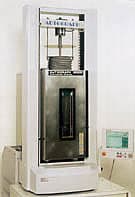Tensile Testing System with Thermostatic Chamber

This thermostatic chamber is ideal for long-stroke tensile testing of large-elongation materials such as rubber and plastic in controlled temperature environments.
Features
Extension bellows enable long-stroke testing in the chamber without the need for the thermostatic chamber extension.
- Eff. tensile stroke Max. 370 mm
- Grip space 0 to 450 mm (example of 250 mm extension type AG-5kNI 5 kN screw type chuck)
Testing can be performed in a wide temperature range.
- Temperature range: -60 °C to +250 °C (TCR2L type)
- 70 °C to 250 °C (TCL-NL type)
250 mm extension type applicable on Autograph
In the case of conventional 250 mm extension type thermostatic chambers, the 500 mm extension type is needed on the Autograph main unit. However, with this thermostatic chamber, the 250 mm extension type is sufficient on the Autograph to configure a reasonably priced long-stroke tensile testing system.
Accommodates large elongation, and a long range with uniform temperature can be ensured.
±1.5 °C at 300 mm in height direction
Integration of the temperature controller with the thermostatic chamber body and downsizing of the stand means that less installation space is required.
News / Events
-
AUTOGRAGH AGS-X2 Series has been released
The Shimadzu AUTOGRAPH AGS-X2 series provides superior performance and practical testing solutions for a wide array of applications. Offering high-level control and intuitive operation, the AGS-X2 series sets a new standard for strength evaluations while providing the utmost in safety considerations in a modern, stylish design.
-
AUTOGRAGH AGS-V Series has been released
Shimadzu Corporation released the Autograph AGS-V Series precision universal testing machine. In this series, the range over which the force measurement accuracy is guaranteed has been increased by a factor of two compared with existing machines. As a result of this new function, the work required to change force measurement sensors and accessories required for measurement can be reduced.
-
High-Speed Video Camera HyperVision HPV-X3 has been released
Recording speed of 20 million frames/second, the highest in its class provides larger, clearer, high-sensitivity recording. HPV-X3 is equipped with a synchronized recording function and high-level analytical capabilities that accommodate a variety of software programs.
-
New Video: AUTOGRAPH AGX-V2 Voice Operation Device XV-Talk
We will introduce how XV-Talk, the world's first voice control device installed in Shimadzu's latest tensile tester AGX-V2, can be used in various scenarios.
-
New Video: AUTOGRAPH AGX-V2 Operation Control Panel Stand-alone test feature
We will introduce a new feature of Shimadzu's latest tensile tester, AGX-V2, a stand-alone testing function using a large color LCD touch panel.
-
New Autograph AGX-V2 Series Precision Universal Testing Machines
The World’s First Testing Machines Equipped with a Voice Operation Device


